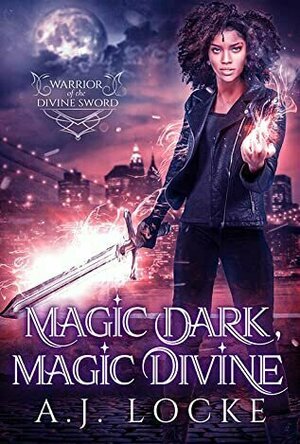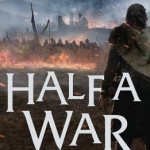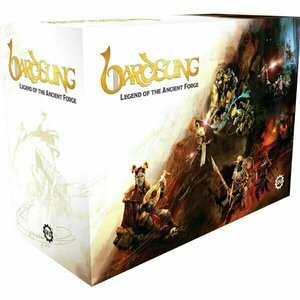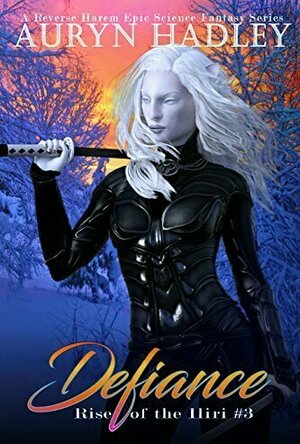Search
Search results
Merissa (13792 KP) rated Magic Dark, Magic Divine (Warrior of the Divine Sword #1) in Books
Nov 5, 2021 (Updated Jul 10, 2023)
MAGIC DARK, MAGIC DIVINE is the first book in the Warrior of the Divine Sword series and, in it, we meet Pennrae who was first alive 300 years ago before she was put into a magical sleep because she broke a contract with a Diviner. She wakes up in a contemporary world, where things have definitely moved on. We meet her eight years down the line when she has managed to get a life put together for herself.
This is a fast-paced story that will keep you on tenterhooks as Pennrae goes from one explosion to another. She finds love and adventure, as well as allies she never expected. It is intricate and twisted which kept my attention from the very start.
Fair warning though - there is one part that had my f'ugly crying! I won't say more, but prepare yourself!
As it is the first book, you get the usual world-building but it is done in a way that is explanatory rather than just an info dump. I found this to be an excellent start of a new series, with a new-to-me author. I thoroughly enjoyed this story and can't wait to see where it goes next. Absolutely recommended by me.
** same worded review will appear elsewhere **
* A copy of this book was provided to me with no requirements for a review. I voluntarily read this book, and the comments here are my honest opinion. *
Merissa
Archaeolibrarian - I Dig Good Books!
Nov 5, 2021
This is a fast-paced story that will keep you on tenterhooks as Pennrae goes from one explosion to another. She finds love and adventure, as well as allies she never expected. It is intricate and twisted which kept my attention from the very start.
Fair warning though - there is one part that had my f'ugly crying! I won't say more, but prepare yourself!
As it is the first book, you get the usual world-building but it is done in a way that is explanatory rather than just an info dump. I found this to be an excellent start of a new series, with a new-to-me author. I thoroughly enjoyed this story and can't wait to see where it goes next. Absolutely recommended by me.
** same worded review will appear elsewhere **
* A copy of this book was provided to me with no requirements for a review. I voluntarily read this book, and the comments here are my honest opinion. *
Merissa
Archaeolibrarian - I Dig Good Books!
Nov 5, 2021
Phil Leader (619 KP) rated Half a War (Shattered Sea, Book 3) in Books
Nov 14, 2019
This is the third book of the Shattered Sea trilogy and takes place a couple of years after the previous book, Half the World. The long forecast war between Gettland and the High King commences with the High King's champion, Bright Yilling, invading Throvenland. Princess Skara manages to escape to Gettland where she joins the allies so that she can take her homeland back from the invaders.
Father Yarvi is also determined to strike back, to carry out the oath of vengeance he swore against his father's killers. To do this he must defeat Bright Yilling and his army and then take on the High King himself. But just how far is he prepared to go in order to secure victory?
I actually can't say too much in detail about this book without giving anything away. Much like the previous book, this one seems like a fairly conventional epic fantasy style story for a good half. But then Abercrombie starts to twist the knife as the reader's expectations based on the usual fantasy tropes are knocked down one by one.
Certainly there is much here that is unconventional in many ways and I confess to having a rather mad smile on my face at one point due to the utter craziness of what is going on - but Abercrombie handles it well having laid the groundwork well in advance. It is never clear who is going live and who is going to die, and who is going to win and who is going to lose.
After the first two books, which have quite a lot of conversations and philosophy, this is essentailly one long drawn out battle against various parties in various locations. Some battles are fought with swords and others with words, but both are just as deadly for the loser. The fight scenes are very violent and as expected it's pretty grim and dark at times.
There is plenty of scope left at the end for more stories set in the world of the Shattered Sea and these would be welcome but it also clear that the story of Yarvi and his revenge has been completed.
Not the best of the series, the first half is probably too conventional but the second half turns so much on its head it redeems the book completely.
Rating: Lots of violent battles and deaths, some scatalogical phrases and some non-explict sexual scenes. Young Adult but more at the Adult than Young end of that spectrum
Father Yarvi is also determined to strike back, to carry out the oath of vengeance he swore against his father's killers. To do this he must defeat Bright Yilling and his army and then take on the High King himself. But just how far is he prepared to go in order to secure victory?
I actually can't say too much in detail about this book without giving anything away. Much like the previous book, this one seems like a fairly conventional epic fantasy style story for a good half. But then Abercrombie starts to twist the knife as the reader's expectations based on the usual fantasy tropes are knocked down one by one.
Certainly there is much here that is unconventional in many ways and I confess to having a rather mad smile on my face at one point due to the utter craziness of what is going on - but Abercrombie handles it well having laid the groundwork well in advance. It is never clear who is going live and who is going to die, and who is going to win and who is going to lose.
After the first two books, which have quite a lot of conversations and philosophy, this is essentailly one long drawn out battle against various parties in various locations. Some battles are fought with swords and others with words, but both are just as deadly for the loser. The fight scenes are very violent and as expected it's pretty grim and dark at times.
There is plenty of scope left at the end for more stories set in the world of the Shattered Sea and these would be welcome but it also clear that the story of Yarvi and his revenge has been completed.
Not the best of the series, the first half is probably too conventional but the second half turns so much on its head it redeems the book completely.
Rating: Lots of violent battles and deaths, some scatalogical phrases and some non-explict sexual scenes. Young Adult but more at the Adult than Young end of that spectrum
Charlie Cobra Reviews (1840 KP) rated the PlayStation 4 version of Kingdom Hearts III in Video Games
Jul 7, 2020
A Ton Of Fun
Kingdom Hearts III is an action/RPG developed and published by Square Enix. It was directed by Tetsuya Nomora and Tai Yasue, produced by Rie Nishi, written by Tetsuya Nomora and Masaru Oka with music composed by Yoko Shimomura, Takeharu Ishimoto, and Tsuyoshi Sekito.
Set after the events of Kingdom Hearts 3D: Dream Drop Distance and a sequel to Kingdom Hearts II; it's a conclusion to the "Dark Seeker Saga" and finds Sora and friends trying to prevent a second Keyblade War. Their search for the seven guardians of light has them visit worlds and cross paths with many different Disney and Pixar characters. Sora, nearly taken over by Xehanort, discovers he has lost his strength as a result. He resumes his travels accompanied by Donald and Goofy, in order to regain his "power of waking'. Traversing the realm of darkness, King Mickey and Riku search for Aqua while Kairi and Lea train to with their new Keyblades.
This game is a lot of fun. I never got to play the other Kingdom Hearts games so this was my first introduction to the series. I really liked the gameplay although sometimes the enemies are nothing more than canon fodder. But it was awesome with interacting with all the Disney and Pixar characters and seeing some of their worlds. I was very confused with the story but it goes by pretty well and there are lots of videos and pages on the internet if you want to catch up or dont remember what's going on or who's who. I didn't include some of the gameplay that showed boss fights because I didn't want to give anything away but the boss fights are a lot of fun. I just had the game on normal so I haven't found it very hard but I dont know if that stays the same if you increase the difficulty. You do have the options of changing gear for your allies and having the group eat meals for buffs as well as upgrade your keyblades but I generally stay away from that unless I have difficulty on a stage or boss. One thing I really didn't like so much was the spaceship battles that you get when traveling from world to world, I found them a bit tedious and annoying. But I'm sure some people liked them. All in all I'd give this game a 7/10. Below is a link to a video showcasing gameplay that I posted to YouTube.
Set after the events of Kingdom Hearts 3D: Dream Drop Distance and a sequel to Kingdom Hearts II; it's a conclusion to the "Dark Seeker Saga" and finds Sora and friends trying to prevent a second Keyblade War. Their search for the seven guardians of light has them visit worlds and cross paths with many different Disney and Pixar characters. Sora, nearly taken over by Xehanort, discovers he has lost his strength as a result. He resumes his travels accompanied by Donald and Goofy, in order to regain his "power of waking'. Traversing the realm of darkness, King Mickey and Riku search for Aqua while Kairi and Lea train to with their new Keyblades.
This game is a lot of fun. I never got to play the other Kingdom Hearts games so this was my first introduction to the series. I really liked the gameplay although sometimes the enemies are nothing more than canon fodder. But it was awesome with interacting with all the Disney and Pixar characters and seeing some of their worlds. I was very confused with the story but it goes by pretty well and there are lots of videos and pages on the internet if you want to catch up or dont remember what's going on or who's who. I didn't include some of the gameplay that showed boss fights because I didn't want to give anything away but the boss fights are a lot of fun. I just had the game on normal so I haven't found it very hard but I dont know if that stays the same if you increase the difficulty. You do have the options of changing gear for your allies and having the group eat meals for buffs as well as upgrade your keyblades but I generally stay away from that unless I have difficulty on a stage or boss. One thing I really didn't like so much was the spaceship battles that you get when traveling from world to world, I found them a bit tedious and annoying. But I'm sure some people liked them. All in all I'd give this game a 7/10. Below is a link to a video showcasing gameplay that I posted to YouTube.

Rooftoppers
Book
This is the winner of the Blue Peter Book Award and the Waterstones Children's Book Prize, and...
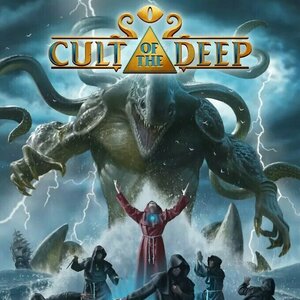
Cult of the Deep
Tabletop Game
You are a cultist, trying to establish your faction's rise to power. Fight over rituals and mythical...
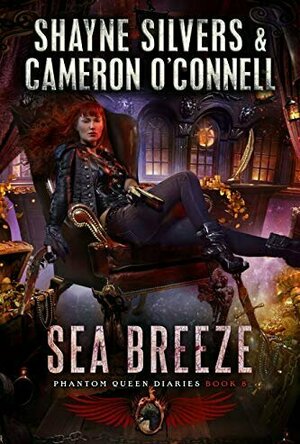
Sea Breeze: Phantom Queen Book 8 - A Temple Verse Series (The Phantom Queen Diaries)
Shayne Silvers and Cameron O'Connell
Book
Remember when dead in the water was just an expression? Not anymore. Fresh from her unplanned...
Movie Metropolis (309 KP) rated Kingsman: The Golden Circle (2017) in Movies
Jun 10, 2019
Welcome back, chaps
Kingsman: The Secret Service was one of the surprise hits of 2014. Marketed poorly by an unassuming set of trailers, the end result was a film as big a surprise as Guardians of the Galaxy was.
We all know what happened. Kingsman senior grossed over $400million worldwide and a sequel was soon greenlit with a much bigger budget and a marketing effort worth of the first film.
But has some of that old-school charm been lost in the transition to high-budget movie event of the summer?
With their headquarters destroyed and the world held hostage by a villainous drug lord (Julianne Moore), members of Kingsman find new allies when they discover a spy organization in the United States known as Statesman. In an adventure that tests their strength and wits, the elite agents band together to battle a ruthless enemy and save the day, something that seems to be a bit of a habit for Eggsy (Taron Egerton) of late.
Thankfully, I’m pleased to tell you that Matthew Vaughn’s follow-up, while not bettering its predecessor, manages to stay away from many of the sequel pitfalls we tend to see nowadays.
Opening with a fantastically filmed cab ride through London’s narrow streets, the first sequence sets up the movie perfectly. This is a rollercoaster ride – loud, at times exhausting but completely and utterly exhilarating.
That familiar cast we grew to love in the first film return including the not-so-secret return of Colin Firth’s Harry. It’s disappointing to have seen the big reveal of his survival from Samuel L Jackson’s bullet in the trailers, but it’s still a welcome return and a smart move by the writers – even if the circumstances surrounding his well-being are a little farfetched.
Taron Egerton is once again on top form and Mark Strong is ever-reliable as intelligence agent, Merlin. Of the newcomers, Channing Tatum, Halle Berry and Jeff Bridges make a small, but noticeable impact on proceedings though I would’ve liked to have seen them a little more throughout the 140-minute runtime.
You’re right to gasp. Kingsman: The Golden Circle is a good 10 minutes or so longer than its predecessor and while the action is choreographed to the same exceptional standard of its forbearer, it does feel like a long film.
Nevertheless, if there’s one thing Matthew Vaughn knows how to direct, it’s action. The increased budget this time around means our heroes embark on a globetrotting mission that includes Cambodia, Italy, the US and of course Blighty. The cinematography is wonderful with the Cambodian lair of our main villain being a particular highlight.
Speaking of which, Julianne Moore is absolutely sublime. Described by Vaughn himself as “Martha Stewart on crack”, she is right up there with Samuel L Jackson’s outlandish Richmond Valentine. Watch out for a surprise turn from Elton John that will have you in stitches whenever the film switches to Moore’s mountain-top lair.
With this and President Alma Coin from The Hunger Games on her CV, she’s proving a great choice to play wicked characters – she’s certainly got the acting chops for it.
Overall, there’s far too much in Kingsman: The Golden Circle to talk about in one review, but it’s fair to say this sequel is a big success. With beautifully choreographed action and some cracking performances, it’s more than a candidate for best film of the year. Flawed? Yes. But you’ll be having too much fun to notice. Bring on the sequel.
https://moviemetropolis.net/2017/09/21/kingsman-the-golden-circle-review/
We all know what happened. Kingsman senior grossed over $400million worldwide and a sequel was soon greenlit with a much bigger budget and a marketing effort worth of the first film.
But has some of that old-school charm been lost in the transition to high-budget movie event of the summer?
With their headquarters destroyed and the world held hostage by a villainous drug lord (Julianne Moore), members of Kingsman find new allies when they discover a spy organization in the United States known as Statesman. In an adventure that tests their strength and wits, the elite agents band together to battle a ruthless enemy and save the day, something that seems to be a bit of a habit for Eggsy (Taron Egerton) of late.
Thankfully, I’m pleased to tell you that Matthew Vaughn’s follow-up, while not bettering its predecessor, manages to stay away from many of the sequel pitfalls we tend to see nowadays.
Opening with a fantastically filmed cab ride through London’s narrow streets, the first sequence sets up the movie perfectly. This is a rollercoaster ride – loud, at times exhausting but completely and utterly exhilarating.
That familiar cast we grew to love in the first film return including the not-so-secret return of Colin Firth’s Harry. It’s disappointing to have seen the big reveal of his survival from Samuel L Jackson’s bullet in the trailers, but it’s still a welcome return and a smart move by the writers – even if the circumstances surrounding his well-being are a little farfetched.
Taron Egerton is once again on top form and Mark Strong is ever-reliable as intelligence agent, Merlin. Of the newcomers, Channing Tatum, Halle Berry and Jeff Bridges make a small, but noticeable impact on proceedings though I would’ve liked to have seen them a little more throughout the 140-minute runtime.
You’re right to gasp. Kingsman: The Golden Circle is a good 10 minutes or so longer than its predecessor and while the action is choreographed to the same exceptional standard of its forbearer, it does feel like a long film.
Nevertheless, if there’s one thing Matthew Vaughn knows how to direct, it’s action. The increased budget this time around means our heroes embark on a globetrotting mission that includes Cambodia, Italy, the US and of course Blighty. The cinematography is wonderful with the Cambodian lair of our main villain being a particular highlight.
Speaking of which, Julianne Moore is absolutely sublime. Described by Vaughn himself as “Martha Stewart on crack”, she is right up there with Samuel L Jackson’s outlandish Richmond Valentine. Watch out for a surprise turn from Elton John that will have you in stitches whenever the film switches to Moore’s mountain-top lair.
With this and President Alma Coin from The Hunger Games on her CV, she’s proving a great choice to play wicked characters – she’s certainly got the acting chops for it.
Overall, there’s far too much in Kingsman: The Golden Circle to talk about in one review, but it’s fair to say this sequel is a big success. With beautifully choreographed action and some cracking performances, it’s more than a candidate for best film of the year. Flawed? Yes. But you’ll be having too much fun to notice. Bring on the sequel.
https://moviemetropolis.net/2017/09/21/kingsman-the-golden-circle-review/
Movie Metropolis (309 KP) rated The Hunger Games: Mockingjay - Part 2 (2015) in Movies
Jun 10, 2019
An emotional goodbye
Over the last three years, The Hunger Games franchise has thrilled and delighted fans and newcomers to the series with its mix of wonderful special effects, a great cast and intriguing plots.
With the second instalment, Catching Fire, proving to be the best in the series, expectations for the finale, Mockingjay Part 2 were incredibly high. But is this the end we all wanted, and more importantly deserved?
Mockingjay Part 2 picks up immediately after the events of Part 1, as Jennifer Lawrence’s Katniss Everdeen recovers from a vicious attack by her friend and on-off lover Peeta, played by Josh Hutcherson in a troubled and career-best performance.
With Katniss becoming a symbol of hope in a time of dictatorship, Lawrence marches with her friends and allies to storm the Capitol and overthrow the tyrannical President Snow, a deliciously evil Donald Sutherland.
The catch? Snow and previous Game makers have booby-trapped the Capitol with a range of sadistic tests trying to stop the rebellion in its tracks.
The Hunger Games has become renowned for a fantastic supporting cast that includes talent like Elizabeth Banks, Woody Harrelson, Stanley Tucci, the late Philip Seymour Hoffman and Julianne Moore, with the latter being particularly memorable.
Unfortunately, as is often the case with large Young Adult franchises, these fantastic actors are lost somewhat as director Francis Lawrence tries to tie up all loose ends with the main teens; Jennifer Lawrence, Josh Hutcherson and Liam Hemsworth.
The aforementioned three have been part of a love triangle so convoluted it’s difficult to remember who is in love with who, but thankfully this takes a back seat to the action, though each of the three brings enough acting credibility to make the more romantic elements bearable.
Moreover, Mockingjay Part 2 pushes the boundaries of the much-maligned 12A certificate. This is by far the most harrowing and bleak of the four films and none of its predecessors were exactly a ray of sunshine. The characters are pushed to breaking point as the realisation of the Capitol’s evil fully sinks in and the inevitable loss of life is both thrilling and utterly devastating.
The special effects have been rightly ramped up for this final instalment with District 13 and the Capitol looking truly stunning. Each of the action sequences is filmed with such confidence and this shows off the exceptional sets much better than the handy cam that plagued the first film.
Unfortunately, the need to fill a movie nearly 140 minutes in length has led to a tone that occasionally jars and drags a little too frequently. This was a problem with Part 2’s predecessor and whilst the idea to split the final book into two films works better here, the balance is still not quite right and still reeks of money-making.
However, each of the action sequences are edge of the seat stuff with an underground sewer providing the film’s most pulse-racing and dramatic scenes. There’s a whiff of Ridley Scott’s Alien in Francis Lawrence’s direction throughout this extended set piece.
Overall, The Hunger Games series has ended on a high. From its beautiful cinematography to an exceptional main and supporting cast, director Francis Lawrence, who has been with the series since Catching Fire, has managed to craft a harrowing end to a group of films whose influence will be felt for many years to come.
https://moviemetropolis.net/2015/11/22/an-emotional-goodbye-the-hunger-games-mockingjay-part-2-review/
With the second instalment, Catching Fire, proving to be the best in the series, expectations for the finale, Mockingjay Part 2 were incredibly high. But is this the end we all wanted, and more importantly deserved?
Mockingjay Part 2 picks up immediately after the events of Part 1, as Jennifer Lawrence’s Katniss Everdeen recovers from a vicious attack by her friend and on-off lover Peeta, played by Josh Hutcherson in a troubled and career-best performance.
With Katniss becoming a symbol of hope in a time of dictatorship, Lawrence marches with her friends and allies to storm the Capitol and overthrow the tyrannical President Snow, a deliciously evil Donald Sutherland.
The catch? Snow and previous Game makers have booby-trapped the Capitol with a range of sadistic tests trying to stop the rebellion in its tracks.
The Hunger Games has become renowned for a fantastic supporting cast that includes talent like Elizabeth Banks, Woody Harrelson, Stanley Tucci, the late Philip Seymour Hoffman and Julianne Moore, with the latter being particularly memorable.
Unfortunately, as is often the case with large Young Adult franchises, these fantastic actors are lost somewhat as director Francis Lawrence tries to tie up all loose ends with the main teens; Jennifer Lawrence, Josh Hutcherson and Liam Hemsworth.
The aforementioned three have been part of a love triangle so convoluted it’s difficult to remember who is in love with who, but thankfully this takes a back seat to the action, though each of the three brings enough acting credibility to make the more romantic elements bearable.
Moreover, Mockingjay Part 2 pushes the boundaries of the much-maligned 12A certificate. This is by far the most harrowing and bleak of the four films and none of its predecessors were exactly a ray of sunshine. The characters are pushed to breaking point as the realisation of the Capitol’s evil fully sinks in and the inevitable loss of life is both thrilling and utterly devastating.
The special effects have been rightly ramped up for this final instalment with District 13 and the Capitol looking truly stunning. Each of the action sequences is filmed with such confidence and this shows off the exceptional sets much better than the handy cam that plagued the first film.
Unfortunately, the need to fill a movie nearly 140 minutes in length has led to a tone that occasionally jars and drags a little too frequently. This was a problem with Part 2’s predecessor and whilst the idea to split the final book into two films works better here, the balance is still not quite right and still reeks of money-making.
However, each of the action sequences are edge of the seat stuff with an underground sewer providing the film’s most pulse-racing and dramatic scenes. There’s a whiff of Ridley Scott’s Alien in Francis Lawrence’s direction throughout this extended set piece.
Overall, The Hunger Games series has ended on a high. From its beautiful cinematography to an exceptional main and supporting cast, director Francis Lawrence, who has been with the series since Catching Fire, has managed to craft a harrowing end to a group of films whose influence will be felt for many years to come.
https://moviemetropolis.net/2015/11/22/an-emotional-goodbye-the-hunger-games-mockingjay-part-2-review/
Lyndsey Gollogly (2893 KP) rated Defiance (Rise of the Iliri #3) in Books
Mar 3, 2020
Contains spoilers, click to show
HER ONLY CHOICE IS TO CHANGE HER WORLD…
Salryc Luxx has come a long way in just four years, from slave to conscript, to elite Black Blade assassin, rising rapidly as her extraordinary abilities are revealed. Promoted to lieutenant after capturing a valuable shipment of metals and laying waste to the invading force, she and Cyno, her partner (in war and love), have been entrusted with a dangerous mission: to assassinate the King of Anglia and the five nobles in line for the throne, leaving the path to ascension clear for their own leader.
That’s one side of the story. The other is that she and Cyno have been assigned this suicide mission as Parliament’s first pass at removing the iliri taint from the military. Either way, without the strength of allies, the Conglomerate of Free Citizens cannot turn back the invaders, whose goal is to wipe out the whole iliri species, so Sal and Cyno are the only hope of ending the continental war devastating their species. Traveling for months, they are so far away from their home base that they’re beyond the mental link that connects the pack. They remain committed to their mission—and to each other, but… unhappily disturbed. They can only hope their separation from the pack bring them closer together. But the danger is, in the absence of the pack, their bond will wither.
A kind deed, helping what they take to be a wounded animal, leads to the discovery of their true nature, to strengthening and re-energizing their pack, and to a surprising alliance that offers hope for the future. The wounded animal, they learn, is a graour wolf, a species of ferocious warriors with language and traits nearly identical to iliri. When two of them ask to join her pack, Sal recruits them as Black Blades and the iliri are no longer the only dog in the fight for iliri freedom.
But Anglia is nothing like the Conglomerate of Free Citizens. Anglians discriminate based on gender, not species. Iliri are thought to be just a myth--until Sal shows her face. To convince the king and his council that yes, a woman really can be a soldier, she's going to have to make her own rules. The enemy is moving. She doesn't have time to deal with outdated court manners.
As the defiance of an entire species rises up in her, she really has no choice—she’ll just have to change the world.
Women readers will thrill to the reverse harem idea that pushes the boundaries of epic fantasy in this second world series that may remind some of Avatar without the scary beasts; or even Game Of Thrones, but happier, with more color—and a dazzling female protagonist. Fans of Anne McCaffrey’s Dragonriders of Pern will find Sal’s planet Ogun a thrilling destination for their next fantasy fix
They just keep getting better! Sal and Cyno are out on their own and they are kicking up a storm! We get to meet the Graour who the Iliri are descended from! We get a chance to see a whole new world building. I love the new characters and you are with them every step of the way on the battlefield it's also such a good feeling when the black blades are all back together and loving their new pack mates. It was only a matter of time before Cyno became her number 1 I'm glad Blaec took it well. Looking forward to book 4!
Salryc Luxx has come a long way in just four years, from slave to conscript, to elite Black Blade assassin, rising rapidly as her extraordinary abilities are revealed. Promoted to lieutenant after capturing a valuable shipment of metals and laying waste to the invading force, she and Cyno, her partner (in war and love), have been entrusted with a dangerous mission: to assassinate the King of Anglia and the five nobles in line for the throne, leaving the path to ascension clear for their own leader.
That’s one side of the story. The other is that she and Cyno have been assigned this suicide mission as Parliament’s first pass at removing the iliri taint from the military. Either way, without the strength of allies, the Conglomerate of Free Citizens cannot turn back the invaders, whose goal is to wipe out the whole iliri species, so Sal and Cyno are the only hope of ending the continental war devastating their species. Traveling for months, they are so far away from their home base that they’re beyond the mental link that connects the pack. They remain committed to their mission—and to each other, but… unhappily disturbed. They can only hope their separation from the pack bring them closer together. But the danger is, in the absence of the pack, their bond will wither.
A kind deed, helping what they take to be a wounded animal, leads to the discovery of their true nature, to strengthening and re-energizing their pack, and to a surprising alliance that offers hope for the future. The wounded animal, they learn, is a graour wolf, a species of ferocious warriors with language and traits nearly identical to iliri. When two of them ask to join her pack, Sal recruits them as Black Blades and the iliri are no longer the only dog in the fight for iliri freedom.
But Anglia is nothing like the Conglomerate of Free Citizens. Anglians discriminate based on gender, not species. Iliri are thought to be just a myth--until Sal shows her face. To convince the king and his council that yes, a woman really can be a soldier, she's going to have to make her own rules. The enemy is moving. She doesn't have time to deal with outdated court manners.
As the defiance of an entire species rises up in her, she really has no choice—she’ll just have to change the world.
Women readers will thrill to the reverse harem idea that pushes the boundaries of epic fantasy in this second world series that may remind some of Avatar without the scary beasts; or even Game Of Thrones, but happier, with more color—and a dazzling female protagonist. Fans of Anne McCaffrey’s Dragonriders of Pern will find Sal’s planet Ogun a thrilling destination for their next fantasy fix
They just keep getting better! Sal and Cyno are out on their own and they are kicking up a storm! We get to meet the Graour who the Iliri are descended from! We get a chance to see a whole new world building. I love the new characters and you are with them every step of the way on the battlefield it's also such a good feeling when the black blades are all back together and loving their new pack mates. It was only a matter of time before Cyno became her number 1 I'm glad Blaec took it well. Looking forward to book 4!
